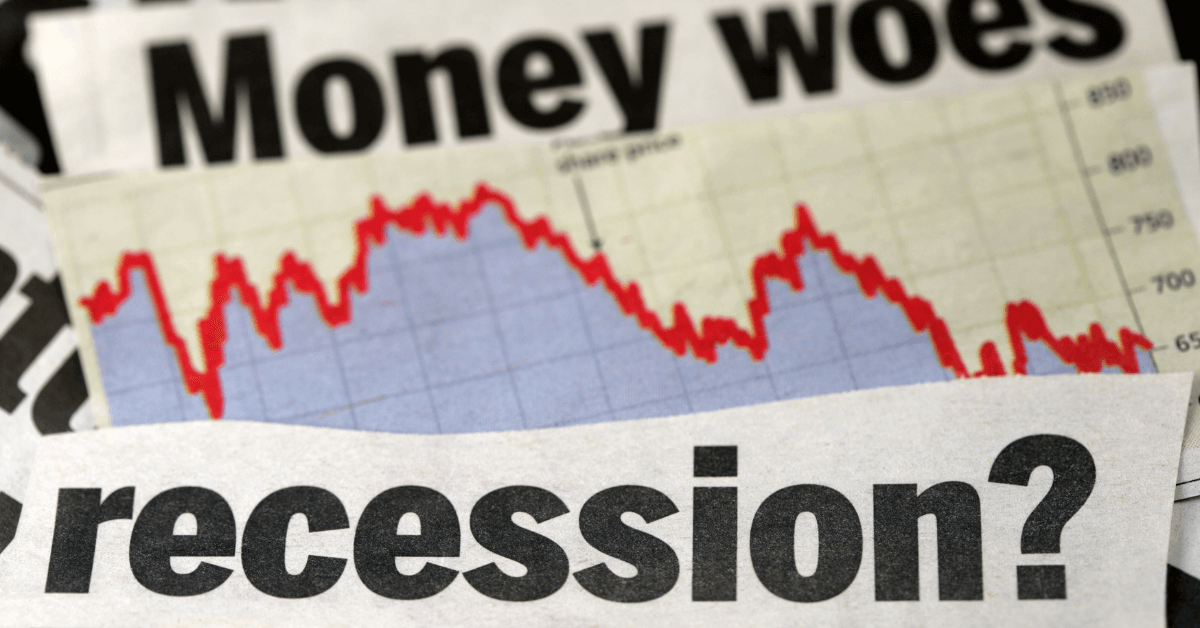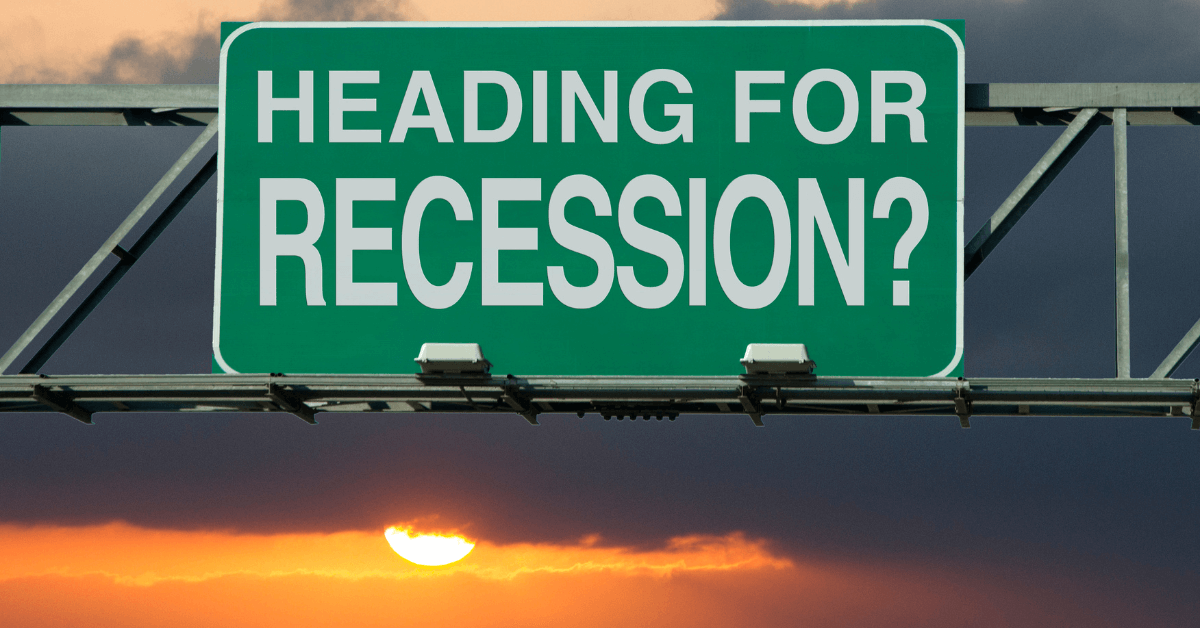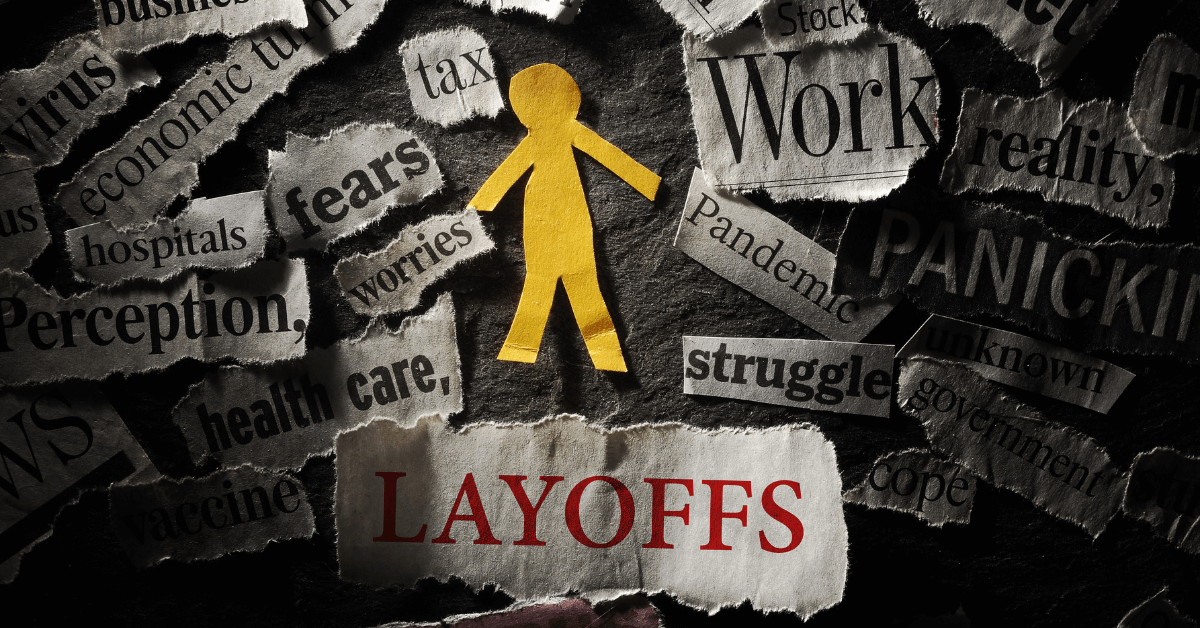What Is a Recession?
August 12, 2022
What Is a Recession?
August 12, 2022
Share this post:

Volatile stock markets, rising interest rates, and the highest inflation rates in 40 years bring one nagging question to the front of Americans’ minds: Are we in a recession?
What Is a Recession?
Definitions abound, so let’s discuss what a recession is—simply put, a recession is when the economy starts shrinking and ends when an economy begins growing again. Investopedia states a recession “refers to a significant decline in general economic activity in a designated region” that lasts several months. A recession usually involves economic struggles, lost jobs/unemployment, less consumer spending causing companies to have lower earnings, and an overall decline in economic output. Recessions are a normal part of the economic cycle, albeit unpleasant and stressful for some.
Economist Julius Shiskin formulated a popular definition of recession in 1974: two consecutive quarters (or six months) of declining real GDP. The National Bureau of Economic Research (NBER) is the authority that declares a recession in general, including the starting and ending dates. The NBER has more broad definition of what a recession is: “a significant decline in economic activity spread across the economy, lasting more than a few months, normally visible in real GDP, real income, employment, industrial production, and wholesale-retail sales.”
One key item to note: Official recessions are not usually declared by the NBER until after they have occurred—but many make careers of predicting, identifying, and commentating on recessions before, during, and after.
Recession Predictors and Indicators
All economies alternate between times of expansion and recession called the business cycle.
There are a variety of ways to predict when a recession will occur. Various economic indicators are monitored to help predict or verify a recession’s onset, including indexes like the ISM Purchasing Managers Index and the Conference Board Leading Economic Index, the Treasury yield curve, real
GDP, housing and consumer spending stats, and unemployment levels.
Predicting recessions is challenging, but some indicators can warn of impending trouble:
- An inverted yield curve – according to Forbes Advisor, “the yield curve is a graph that plots the market value—or the yield—of a range of U.S. Government bonds” of ranging terms. A yield curve inversion exists when long-term yields are lower than short-term yields; this can predict a future recession.
- Decline in consumer spending – this indicates consumers don’t feel as confident spending money, and less consumer spending slows the economy.
- A drop in the Leading Economic Index (LEI) – this index aims to forecast future economic trends using factors like unemployment insurance applications, new manufacturing orders, and stock market performance. A decline in this index can indicate trouble is on the horizon.
- Sudden stock market declines
- Rising unemployment levels
While there are indicators to help predict a recession, nothing really exists to prevent one—partly because consumer sentiment (e.g., our thoughts and feelings toward the economy, spending, etc.) have an influence over—get this!—the economy. Governments often take actions to try to lessen a recession’s severity, though.

What Causes Recessions?
According to Forbes Advisor, some of the main drivers of a recession are:
- A sudden economic shock – for example, the Covid-19 pandemic caused an economic shock when economies were shutdown globally
- Excessive debt – this debt can be taken on by businesses, individuals, governments, and so on. Growing debt can cause defaults or bankruptcies, which can greatly impact the economy. For example, the housing bubble in the early 2000s culminated in the Great Recession beginning in 2008.
- Asset bubbles – optimism can run high when the economy is strong—as the former Federal Reserve Chair Alan Greenspan called it, “irrational exuberance.” According to Forbes Advisor, “irrational exuberance inflates stock market or real estate bubbles—and when the bubbles pop, panic selling can crash the market, causing a recession.”
- Increasing/high inflation or deflation – some inflation is normal and actually good for the economy, but excessive inflation can topple the economy and lead to a recession. The Federal Reserve attempts to combat inflation by raising interest rates, making the cost of taking on debt more expensive—but raising interest rates too quickly can cause a recession in itself. On the flip side, deflation can cause wages to decrease, curbing consumer spending. “When a deflationary feedback loop gets out of hand, people and business stop spending, which undermines the economy. Central banks and economists have few tools to fix the underlying problems that cause deflation.”
- Technological breakthroughs – technological advancements are generally positive for the economy, as they can increase productivity, improve the product lifecycle, and make purchasing goods easier, among many other reasons. But jobs can be eliminated and entire professions made obsolete due to these technological breakthroughs, which can further drive the economy into short-term recessions.
Recession or Depression?
The two terms sound similar but one is far worse—a depression generally results in higher unemployment and steeper GDP declines and lasts longer than a repression. A depression’s impacts are felt deeper and longer. The Great Depression started in 1929 until 1933, but the economy didn’t fully recover until World War II in the ‘40s. According to data from NBER tracking recessions between 1945–2009, the average recession lasted 11 months, and there have been 34 U.S. recessions from 1984–2020.

How a Recession Could Impact You
One of the biggest impacts an individual might experience is job loss, as rising unemployment is a common feature of recessions. It can also be difficult to find a new job because many more people are out of work and on the job hunt as well. Companies may also pause or slow down hiring, making it even harder to find a new job. Those who do keep their jobs may experience cuts in hours, pay, and benefits and lose opportunities for promotions/pay raises for a time.
Investments, like your stocks, bonds, real estate, 401(k)s and IRAs, and other assets, can lose money during a recession. This can significantly impact both personal and retirement savings—if you’re close to making a big purchase (like a home, especially if interest rates are rising) or retiring, this can certainly upset your plans. In some cases, defaulting on loans like mortgages and auto loans can cause you to lose your home or other assets.
Consumers generally spend less during a recession, which means company profits are reduced. This can lead to bankruptcies and businesses closing, as well as additional job losses. Lenders may approve fewer mortgages, loans, and other financing types during a recession. These are just some of the effects a recession can have on individuals, companies, and economies.
While recessions are a natural part of the business cycle, just the word can strike fear into the hearts of many. The silver lining is that recessions are not permanent and economies can recover.
If you want to learn about more personalized and advanced wealth management strategies, schedule a 15-minute call with the Liberty Group team.
Schedule Your Complimentary 15-Minute Call
Want expert retirement and investing advice? Subscribe to our YouTube channel and check out our weekly podcast with The Sandman!
Listen to Protect Your Assets anywhere you get your podcasts:
Standard Disclosure
This blog expresses the author’s views as of the date indicated, are subject to change without notice, and may not be updated. The information contained within is believed to be from reliable sources. However, its accurateness, completeness, and the opinions based thereon by the author are not guaranteed – no responsibility is assumed for omissions or errors. This blog aims to expose you to ideas and financial vehicles that may help you work towards your financial goals. No promises or guarantees are made that you will accomplish such goals.
Past performance is no guarantee of future results, and any expected returns or hypothetical projections may not reflect actual future performance or outcomes. All investments involve risk and may lose money. Nothing in this document should be construed as investment, tax, financial, accounting, or legal advice. Each prospective investor must evaluate and investigate any investments considered or any investment strategies or recommendations described herein (including the risks and merits thereof), seek professional advice for their particular circumstances, and inform themselves about the tax or other consequences of any investments or services considered.
Investment advisory services are offered through Liberty Wealth Management, LLC (“LWM”), DBA Liberty Group, an SEC-registered investment adviser. For additional information on LWM or its investment professionals, please visit www.adviserinfo.sec.gov or contact us directly at 411 30th Street, 2nd Floor, Oakland, CA 94609, T: 510-658-1880, F: 510-658-1886, www.libertygroupllc.com. Registration with the U.S. Securities and Exchange Commission or any state securities authority does not imply a certain level of skill or training.
References
Investopedia. (March 25, 2022). Guide to Economic Recession. https://www.investopedia.com/terms/r/recession.asp
National Bureau of Economic Research. (n.d.) Business Cycle Dating. https://www.nber.org/research/business-cycle-dating
Rodeck, David. (July 12, 2022). What Is A Recession? Forbes. https://www.forbes.com/advisor/investing/what-is-a-recession/
Simonetti, Isabella, & Chokshi, Niraj. (June 24, 2022). What is a recession, and when is the next one going to begin? NY Times. https://www.nytimes.com/2022/06/24/business/what-is-a-recession.html
